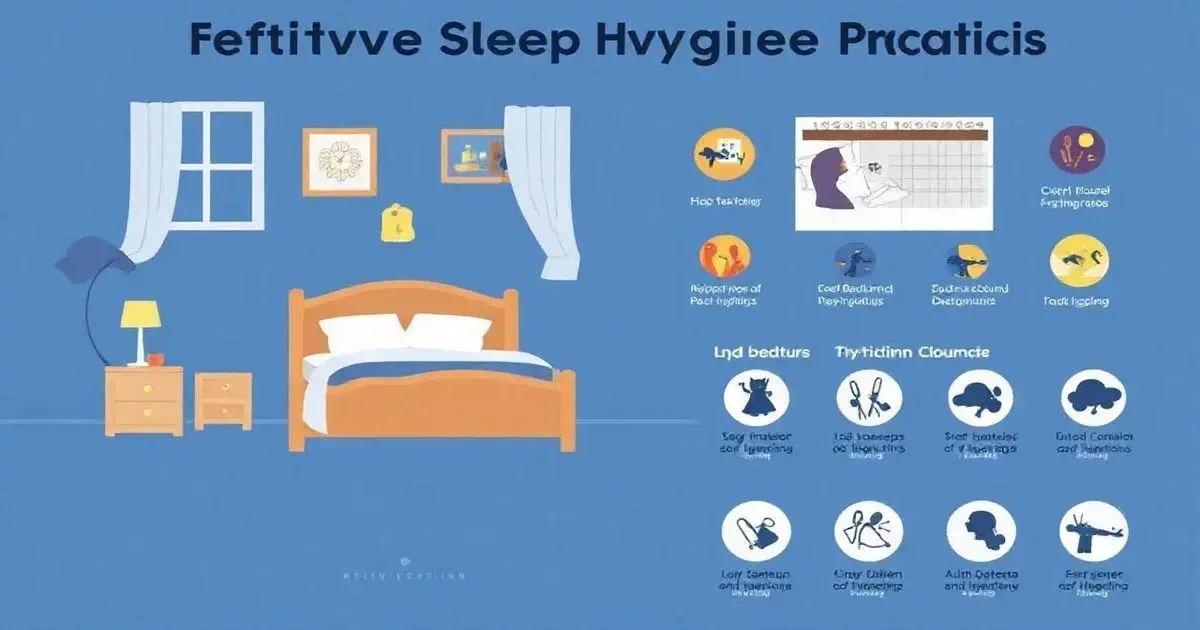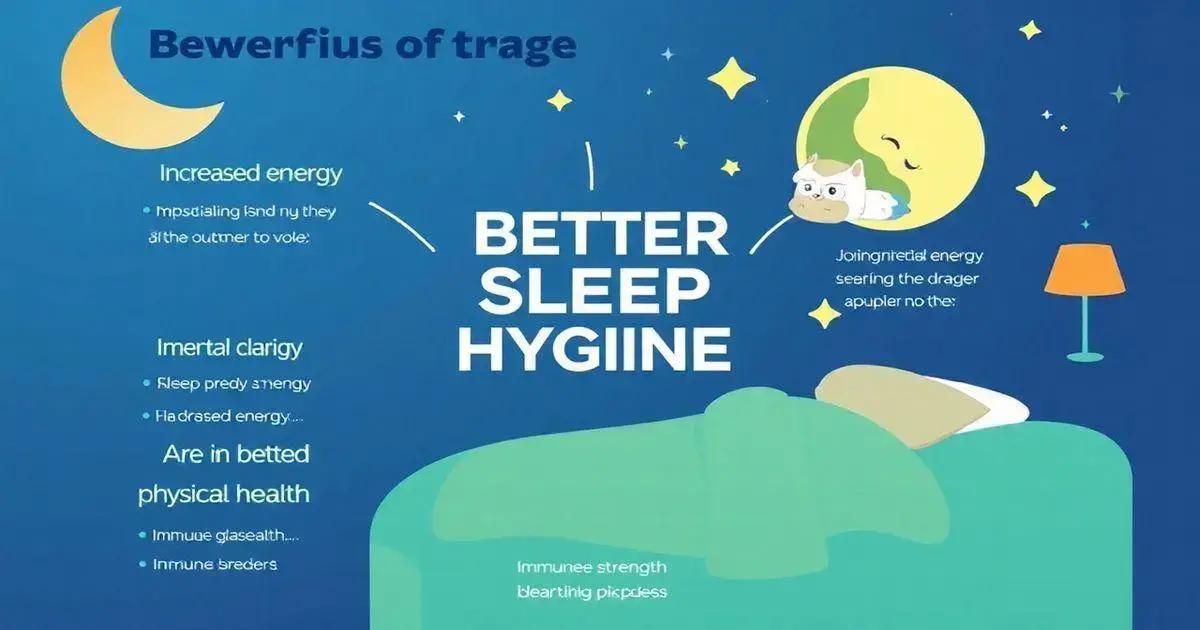Improving sleep hygiene is essential for addressing fatigue by promoting better sleep quality through practices such as maintaining a consistent sleep schedule, optimizing your sleep environment, and limiting stimulants. This leads to increased energy levels, enhanced mental clarity, and overall better health.
Are you feeling tired all the time? Discover how to address fatigue by improving sleep hygiene. Sleep hygiene refers to the habits and practices that enhance your ability to sleep well. With a few simple changes, you can improve your sleep quality, reduce fatigue, and feel more energized throughout the day. In this article, we will explore the importance of sleep hygiene, identify common fatigue causes, and provide effective practices to help you achieve restful nights.
Understanding Sleep Hygiene

Understanding sleep hygiene is crucial for achieving better rest and combating fatigue. Sleep hygiene consists of behavioral and environmental practices that promote sound sleep. These habits can significantly enhance your sleep quality and overall health.
There are several key components to sleep hygiene that everyone should consider. First, maintaining a regular sleep schedule helps your body’s internal clock. Going to bed and waking up at the same time every day can improve your sleep consistency.
Creating a Comfortable Sleep Environment
Your sleep environment plays a vital role in your ability to fall and stay asleep. Ensure your bedroom is dark, quiet, and cool. Use blackout curtains to block any unwanted light and consider earplugs or a white noise machine to drown out disturbing sounds. Additionally, investing in a good mattress and pillows that suit your sleeping style can make a noticeable difference in comfort.
Limit Exposure to Screens
Limiting screen time, especially before bed, is essential. The blue light emitted by phones, tablets, and computers can interfere with the production of melatonin, the hormone responsible for regulating sleep. Try to turn off these devices at least an hour before going to sleep.
Be Mindful of What You Consume
What you eat and drink can also impact your sleep hygiene. Avoid large meals, caffeine, and alcohol close to bedtime. Instead, opt for a light snack if you’re hungry. Herbal teas or warm milk can promote relaxation before sleep.
Establish a Calming Pre-Sleep Routine
Creating a calming bedtime routine can signal your body that it’s time to wind down. Engage in relaxing activities such as reading, gentle stretches, or meditation. This can ease stress and encourage a smoother transition to sleep.
By incorporating these elements into your daily routine, you’ll be better equipped to understand and improve your sleep hygiene, leading to reduced fatigue and a more refreshed feeling each day.
Common Causes of Fatigue

Fatigue can stem from various sources, and understanding these common causes is essential for addressing it effectively. One of the most prevalent causes is lack of sleep. When individuals do not get enough rest, they often feel exhausted and unfocused during the day. It’s essential to prioritize good sleep hygiene to combat this issue.
Stress and Anxiety
Stress and anxiety can also contribute significantly to fatigue. When the mind is constantly preoccupied with worries, it can be difficult to relax and sleep soundly. This heightened state of stress can lead to sleep disturbances, making fatigue more pronounced.
Poor Nutrition
Poor nutrition is another leading cause of fatigue. A diet low in essential nutrients can leave you feeling lethargic and fatigued. Foods that are high in sugar or caffeine may provide a temporary energy boost but can lead to crashes that leave you feeling more tired. Consuming a balanced diet filled with fruits, vegetables, whole grains, and proteins is crucial for maintaining energy levels.
Medical Conditions
Several medical conditions can also lead to fatigue. These include anemia, thyroid disorders, chronic fatigue syndrome, and sleep apnea. If fatigue persists despite changes in sleep hygiene and lifestyle, it may be wise to consult with a healthcare professional to identify any underlying health issues.
Lack of Physical Activity
Interestingly, a sedentary lifestyle can contribute to fatigue as well. Regular physical activity can boost your energy levels by improving circulation and releasing endorphins. Incorporating even light exercise into your daily routine can help enhance your mood and energy levels.
By recognizing these common causes of fatigue, you can take targeted steps to improve your well-being and overall energy levels.
Effective Sleep Hygiene Practices

Implementing effective sleep hygiene practices is essential for enhancing your sleep quality and reducing fatigue. Here are several key strategies you can adopt:
Establish a Consistent Sleep Schedule
Go to bed and wake up at the same time every day, even on weekends. This consistency helps regulate your body’s internal clock, making it easier to fall asleep and wake up refreshed.
Create a Bedtime Ritual
Engaging in a relaxing bedtime ritual can signal to your body that it’s time to wind down. Consider activities such as reading a book, taking a warm bath, or practicing deep breathing exercises to help calm your mind.
Optimize Your Sleep Environment
Ensure that your bedroom is comfortable and conducive to sleep. Keep the room dark, quiet, and cool. Use blackout curtains to block outside light and consider using a white noise machine to mask disruptive sounds.
Limit Naps
If you find yourself feeling fatigued during the day, be cautious with naps. While a short nap can refresh you, long or irregular naps can negatively impact your nightly sleep schedule. Aim for naps of 20 to 30 minutes if needed.
Limit Stimulants
Avoid caffeine and nicotine, especially in the hours leading up to bedtime. Both can disrupt your ability to fall asleep. Also, consider reducing alcohol consumption, as it can affect the quality of your sleep.
Engage in Regular Physical Activity
Incorporating regular exercise into your daily routine can contribute positively to your sleep. Aim for at least 30 minutes of physical activity most days of the week. However, try to avoid vigorous workouts close to bedtime.
Mind Your Diet
Pay attention to what you eat and drink before bed. Large meals and spicy foods may cause discomfort and disrupt sleep. Instead, opt for light snacks if you’re hungry.
By implementing these effective sleep hygiene practices, you can create a supportive environment that aids restful sleep and reduces feelings of fatigue.
Benefits of Better Sleep Hygiene

Improving your sleep hygiene brings a multitude of benefits that can enhance your daily life and overall well-being. Here are several key advantages:
Increased Energy Levels
When you practice good sleep hygiene, you are more likely to enjoy restful and uninterrupted sleep. This leads to increased energy levels during the day, allowing you to be more productive and engaged in activities.
Enhanced Mental Clarity
Better sleep improves your cognitive function. With adequate rest, your brain can process information more effectively, enhancing memory, concentration, and decision-making abilities. This mental clarity is essential for accomplishing daily tasks and responsibilities.
Improved Mood
Sufficient sleep and good sleep hygiene contribute to a balanced mood. Those who sleep well are less likely to experience feelings of irritability or stress, leading to a more positive outlook on life and healthier relationships.
Better Physical Health
Quality sleep is closely linked to physical health. Enhanced sleep hygiene practices can reduce the risk of chronic conditions such as obesity, diabetes, and heart disease. During sleep, your body repairs itself, making quality sleep vital for maintaining health.
Stronger Immune System
Consistent, quality sleep strengthens your immune system, helping you fend off illnesses. When your body gets the rest it needs, it can produce proteins and hormones that are critical for your immune system to function properly.
Regulated Sleep Patterns
By adhering to effective sleep hygiene, you can establish healthy sleep patterns. This regulates your circadian rhythm, making it easier to fall asleep and wake up at consistent times. Improved sleep patterns lead to better sleep quality and quantity.
Incorporating better sleep hygiene practices yields numerous benefits that can positively impact your life, contributing to improved mental and physical health.
In Summary, Improving Sleep Hygiene is Essential
Addressing fatigue by improving sleep hygiene is a vital step toward enhancing your overall well-being. By implementing effective sleep practices, you can increase energy levels, improve mental clarity, and foster a more positive mood.
Understanding the common causes of fatigue and recognizing the benefits of better sleep hygiene can motivate you to make necessary changes in your daily routine. With consistent effort and dedication to healthier sleep habits, you can experience enhanced physical health, a stronger immune system, and regulated sleep patterns.
Ultimately, taking control of your sleep hygiene will lead to a refreshing quality of life and a more vibrant and active daily experience.
FAQ – Frequently Asked Questions about Addressing Fatigue by Improving Sleep Hygiene
What is sleep hygiene and why is it important?
Sleep hygiene refers to the practices and habits that promote better sleep quality. It is important because good sleep hygiene can help reduce fatigue, improve mental clarity, and enhance overall health.
How can I improve my sleep hygiene?
You can improve sleep hygiene by maintaining a consistent sleep schedule, creating a comfortable sleep environment, limiting screen time before bed, and avoiding stimulants like caffeine.
What are the common causes of fatigue?
Common causes of fatigue include lack of sleep, stress and anxiety, poor nutrition, medical conditions, and a sedentary lifestyle.
How does better sleep hygiene affect my daily life?
Better sleep hygiene can lead to increased energy levels, improved mood, enhanced mental clarity, better physical health, and a stronger immune system.
Can exercise help improve my sleep hygiene?
Yes, regular physical activity can enhance sleep quality. However, it is best to avoid vigorous exercise close to bedtime.
What should I avoid before going to bed?
Avoid large meals, caffeine, nicotine, and alcohol in the hours leading up to bedtime, as these can disrupt your sleep.













